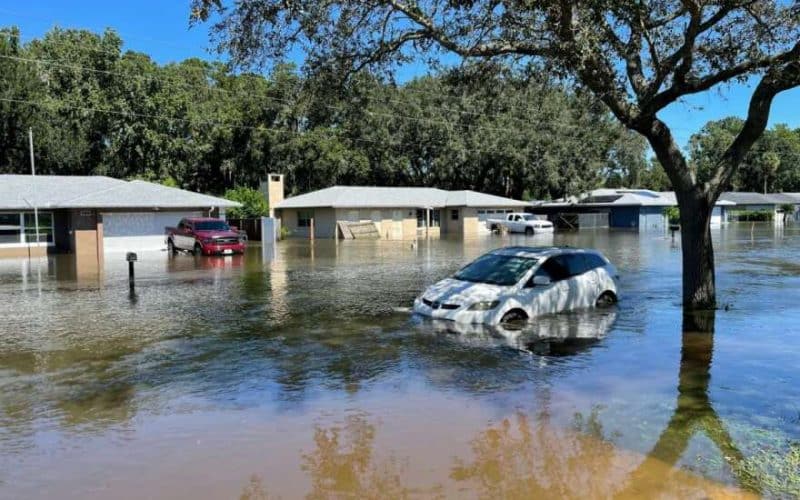Florida is one of the most flood-prone states in the union due to hurricanes, tropical storms, and rising sea levels, and you’re not even at risk if you don’t live close to the beach. For this reason, no matter where you live in the state of Florida, you might want to think about getting flood insurance.
For example, an estimate from the analytics company CoreLogic states that Hurricane Ian in 2022 damaged Florida to the tune of $40 billion to $64 billion. Heavy rainfall caused rivers and ponds to overflow, causing catastrophic flooding in inland areas as well, even though the Gulf Coast was hardest hit.
According to CoreLogic, uninsured flood damage accounted for between $10 billion and $16 billion of Ian’s overall damages. Many homeowners and localities had little to no financial support to help them pick up the pieces if they didn’t have flood insurance.
How Does Flood Insurance Work In Florida?
You can get compensation from flood insurance for losses to your house and possessions following a flood. You can have two different policies if you have NFIP coverage: one for your home’s structure and another for your possessions, or “contents.” If a flood destroys both your home and possessions, you will be required to file two claims and pay two deductibles.
Do You Need Flood Insurance In Florida?
Depending on where you live and your insurance provider, you might need to purchase flood insurance in Florida. Your lender will probably insist that you purchase flood insurance if you have a mortgage and your house is located in a “Special Flood Hazard Area” (SFHA), as defined by the federal government.
There is a 1% or greater danger of flooding in an SFHA every year. On the website of the Federal Emergency Management Agency, you may determine if your house is located in one of these high-risk flood zones.
To be eligible for future federal aid, if you live in an SFHA and have ever received disaster assistance from the federal government due to a flood at your address, you must continue to have flood insurance. Even if assistance was already provided to the former owner of your house, this need still stands
Nevertheless, as of right now, no Florida law requires sellers to reveal whether or not their house has ever flooded. You can get the flood loss history of your property from FEMA, or you can ask the prior owner if they will willingly give this information.
Not a resident of an SFHA? If you have a homeowners policy with Citizens Property Insurance Corp., you might still need to get flood insurance. Citizens is the state-funded insurer of last resort. A new state legislation mandates that by the following dates, everyone having a residential Citizens policy that includes wind coverage must purchase flood insurance:
| Effective date | Which policies are affected |
| July 1, 2023 | All existing Citizens policyholders living in a Special Flood Hazard Area. |
| Jan. 1, 2024 | Homes with dwelling coverage of $600,000 or more. |
| Jan. 1, 2025 | Homes with dwelling coverage of $500,000 or more. |
| Jan. 1, 2026 | Homes with dwelling coverage of $400,000 or more. |
| Jan. 1, 2027 | All other insured homes. |
Condo owners covered by Citizens are exempt from this law and are free to decide whether to get flood insurance.
What Does Flood Insurance Cover In Florida?
Flood insurance protects your house against storm surges, overflowing waterways, and surface runoff from severe precipitation. For these kinds of incidents, homeowner’s insurance typically offers no coverage.
“An excess of water on land that is normally dry, affecting two or more acres of land or two or more properties” is how the NFIP describes flooding.
Because of this restrictive definition, flood insurance won’t cover all types of water damage.
For instance, your homeowner’s insurance policy would probably cover the damage resulting from a busted pipe or your dishwasher spraying soapy water all over your kitchen. However, a flood insurance policy wouldn’t.
Your possessions are insured up to $100,000 and the structure of your house up to $250,000 under an NFIP policy; private flood insurance firms may be able to offer larger coverage levels.
There are many restrictions associated with NFIP rules. For example, most objects in basements are not covered, and if your home is destroyed by flooding, you will not be compensated for living elsewhere.
How Much Does Insurance Cost In Florida?
For coverage from the federally subsidized National Flood Insurance Program, the average annual cost of flood insurance in Florida is $677. The primary provider of flood insurance in Florida is the NFIP. A number of variables, like your home’s elevation and closeness to water sources, will affect your flood insurance rate.
Cost of Flood Insurance Florida By County
The average cost of flood insurance by county is broken down below for each county. These prices exclude the cost of private flood insurance and only display the cost of NFIP policies, which include commercial premises.
| County | Average annual rate |
| Alachua | $609 |
| Baker | $714 |
| Bay | $423 |
| Bradford | $687 |
| Brevard | $513 |
| Broward | $468 |
| Calhoun | $840 |
| Charlotte | $1,138 |
| Citrus | $1,356 |
| Clay | $665 |
| Collier | $750 |
| Columbia | $650 |
| DeSoto | $743 |
| Dixie | $914 |
| Duval | $611 |
| Escambia | $603 |
| Flagler | $554 |
| Franklin | $1,451 |
| Gadsden | $726 |
| Gilchrist | $742 |
| Glades | $540 |
| Gulf | $988 |
| Hamilton | $585 |
| Hardee | $644 |
| Hendry | $799 |
| Hernando | $955 |
| Highlands | $482 |
| Hillsborough | $975 |
| Holmes | $812 |
| Indian River | $696 |
| Jackson | $724 |
| Jefferson | $611 |
| Lafayette | $769 |
| Lake | $579 |
| Lee | $996 |
| Leon | $694 |
| Levy | $1,267 |
| Liberty | $611 |
| Madison | $631 |
| Manatee | $898 |
| Marion | $530 |
| Martin | $600 |
| Miami-Dade | $477 |
| Monroe | $1,476 |
| Nassau | $589 |
| Okaloosa | $488 |
| Okeechobee | $639 |
| Orange | $525 |
| Osceola | $511 |
| Palm Beach | $455 |
| Pasco | $931 |
| Pinellas | $955 |
| Polk | $516 |
| Putnam | $761 |
| Santa Rosa | $592 |
| Sarasota | $886 |
| Seminole | $571 |
| St. Johns | $619 |
| St. Lucie | $480 |
| Sumter | $475 |
| Suwannee | $705 |
| Taylor | $1,158 |
| Union | $757 |
| Volusia | $439 |
| Wakulla | $1,422 |
| Walton | $419 |
| Washington | $729 |
Cost of Flood Insurance In Florida By City
The average cost of flood insurance in a few of Florida’s biggest cities is shown below. This information does not represent the typical costs for private flood insurance; rather, it is specific to all NFIP policies, including commercial coverage.
| City | Average annual rate |
| Boca Raton | $445 |
| Bradenton | $715 |
| Cape Coral | $927 |
| Fort Lauderdale | $472 |
| Fort Myers | $692 |
| Gainesville | $599 |
| Hialeah | $408 |
| Hollywood | $486 |
| Homestead | $541 |
| Jacksonville | $586 |
| Kissimmee | $701 |
| Lake Worth | $527 |
| Lakeland | $485 |
| Miami | $324 |
| Naples | $929 |
| Ocala | $552 |
| Orlando | $533 |
| Pensacola | $802 |
| Pompano Beach | $391 |
| Port St. Lucie | $519 |
| Sarasota | $934 |
| St. Petersburg | $1,029 |
| Tallahassee | $718 |
| Tampa | $952 |
| West Palm Beach | $312 |
How Flood Insurance Costs in Florida Might Increase
The NFIP’s new Risk Assessment 2.0 assessment system will result in higher flood insurance premiums for many Florida consumers. In order to better represent each property’s flood risk in premiums, FEMA started implementing the new rates in 2021.
Under the new rating process, just 20% of Florida policyholders witnessed a decrease in their flood insurance rates; the majority are paying the same or more.
Federal law typically restricts your flood insurance rate increase to no more than 18% in a single year. Therefore, it might take several years of 18% rises for undervalued high-risk properties to reach what the FEMA regards as the genuine risk-based premium.
FEMA recently published statistics demonstrating the discrepancy between the rates for flood insurance that are currently in effect and those that would be under Risk Rating 2.0.
Based on this information, Floridians with NFIP insurance for single-family homes are currently paying $958 annually on average under Risk Rating 2.0. Under the new rating system, however, the fee that accurately represents the flood risk associated with those properties would be $2,213 annually. Accordingly, the average policyholder should anticipate an increase in the rate of 18% annually until they achieve the entire risk-based premium.
The amount that flood insurance policyholders in each Florida county were paying as of September 30, 2022, when the data was gathered, is displayed in the table below. The amount they would pay if their rates were determined by Risk Rating 2.0, which takes into account the real flood risk to their property, is shown next to that rate in the table. The percentage difference indicates the amount that the typical policyholder in that county might anticipate paying more over time.
It should be noted that the current average rates listed below differ from those in the table above since this data only includes single-family home policies that were renewed by September 30, 2022, under Risk Rating 2.0. Every NFIP policy is shown in the table below.
| County | Current average cost | Risk-based average cost | Percentage difference |
| Florida state average | $958 | $2,213 | 131% |
| Alachua | $645 | $875 | 36% |
| Baker | $763 | $1,007 | 32% |
| Bay | $774 | $1,726 | 123% |
| Bradford | $739 | $983 | 33% |
| Brevard | $668 | $2,367 | 254% |
| Broward | $756 | $1,254 | 66% |
| Calhoun | $864 | $1,643 | 90% |
| Charlotte | $1,428 | $3,687 | 158% |
| Citrus | $1,492 | $3,147 | 111% |
| Clay | $760 | $1,289 | 70% |
| Collier | $1,053 | $3,980 | 278% |
| Columbia | $741 | $1,119 | 51% |
| DeSoto | $872 | $1,474 | 69% |
| Dixie | $1,262 | $1,945 | 54% |
| Duval | $710 | $1,612 | 127% |
| Escambia | $828 | $1,886 | 128% |
| Flagler | $757 | $2,372 | 213% |
| Franklin | $1,664 | $5,195 | 212% |
| Gadsden | $810 | $1,677 | 107% |
| Gilchrist | $858 | $1,187 | 38% |
| Glades | $646 | $1,584 | 145% |
| Gulf | $1,044 | $2,507 | 140% |
| Hamilton | $615 | $1,311 | 113% |
| Hardee | $719 | $866 | 20% |
| Hendry | $769 | $1,298 | 69% |
| Hernando | $1,066 | $2,070 | 94% |
| Highlands | $544 | $598 | 10% |
| Hillsborough | $1,132 | $2,550 | 125% |
| Holmes | $847 | $1,275 | 51% |
| Indian River | $866 | $2,773 | 220% |
| Jackson | $834 | $1,338 | 60% |
| Jefferson | $752 | $880 | 17% |
| Lafayette | $873 | $1,174 | 34% |
| Lake | $641 | $825 | 29% |
| Lee | $1,285 | $3,965 | 209% |
| Leon | $709 | $1,221 | 72% |
| Levy | $1,725 | $3,328 | 93% |
| Liberty | $1,083 | $1,465 | 35% |
| Madison | $679 | $1,102 | 62% |
| Manatee | $1,064 | $2,114 | 99% |
| Marion | $579 | $659 | 14% |
| Martin | $788 | $2,235 | 184% |
| Miami-Dade | $829 | $1,611 | 94% |
| Monroe | $1,759 | $4,622 | 163% |
| Nassau | $757 | $1,870 | 147% |
| Okaloosa | $797 | $2,030 | 155% |
| Okeechobee | $717 | $1,422 | 98% |
| Orange | $606 | $707 | 17% |
| Osceola | $613 | $671 | 9% |
| Palm Beach | $695 | $1,191 | 71% |
| Pasco | $1,096 | $1,753 | 60% |
| Pinellas | $1,538 | $3,258 | 112% |
| Polk | $600 | $651 | 9% |
| Putnam | $953 | $1,783 | 87% |
| Santa Rosa | $723 | $1,269 | 76% |
| Sarasota | $1,138 | $2,439 | 114% |
| Seminole | $633 | $843 | 33% |
| St. Johns | $798 | $1,984 | 149% |
| St. Lucie | $696 | $1,709 | 146% |
| Sumter | $563 | $615 | 9% |
| Suwannee | $762 | $1,154 | 51% |
| Taylor | $1,518 | $2,847 | 88% |
| Union | $820 | $1,245 | 52% |
| Volusia | $717 | $1,337 | 86% |
| Wakulla | $1,627 | $3,092 | 90% |
| Walton | $729 | $1,501 | 106% |
| Washington | $755 | $1,054 | 40% |
How to Get Florida Flood Insurance
You can purchase flood insurance through an independent agent or through your present homeowner’s insurance provider; in some areas, you can select between private flood insurance and the National Flood Insurance Program (NFIP), which provides more comprehensive coverage.
A list of firms that offer the NFIP’s policies may be found on this page from the Florida Office of Insurance Regulation. Notable insurers, including Allstate, Farmers, and Liberty Mutual, are among the companies on this list.
It’s important to keep in mind that most flood insurance coverage has a waiting period between the time you purchase the policy and when it becomes effective. Private companies may have shorter waiting periods than the NFIP, but generally speaking, you cannot purchase flood insurance the day before a hurricane hits and start receiving coverage right away.
How to Reduce the Cost of Flood Insurance in Florida
Owning a property in Florida can get costly, especially when it comes to flood insurance and the rising cost of Florida homeowners insurance. Here are some strategies to cut costs.
#1. Shop Around
Compare rates from private flood insurance providers to the National Flood Insurance Program (NFIP); an independent insurance agent can assist you in locating such providers.
#2. Protect Yourself From Flooding
Take precautions to lessen your risk of flooding, such as the following, and the NFIP may reduce your premium for flood insurance.
- Erecting elevated platforms for utilities such as air conditioning, heating, and water heaters.
- Completing the interior of your basement.
- Flood vent installation
- Adding value to your house.
Keep in mind that these renovations can be costly, so before making the investment, you might want to speak with an agent about the kind of savings you can anticipate.
#3. Choose a Higher Deductible
A greater deductible is the portion of a flood claim that you bear financial responsibility for; if you can afford to pay more for repairs, your annual premium for flood insurance will be lower.
When raising your deductibles, be sure you have sufficient funds on hand to cover the increased amount. Keep in mind that the NFIP sells policies for the structure of your home separately from policies that cover your belongings. This means that if a flood damages both your house and your belongings, you may wind up paying two separate deductibles.
#4. Get an Elevation Certificate
Obtain an elevation certificate, which can help confirm your eligibility for a reduced premium. It contains information about the structure that may affect your home’s flood risk, including the elevation of the lowest level. You can submit a certificate of elevation to your insurance agent.
If your home does not currently have an EC on file, you can engage an architect, land surveyor, or engineer to construct one. First, check with the local floodplain manager.
Does Florida Offer Flood Insurance to All Residents?
Yes, flood insurance is available to all residents of Florida through the National Flood Insurance Program (NFIP). However, if you live in a region where the danger of flooding is particularly high, you may not be able to obtain private flood insurance.
Is Flood Insurance Worth It In Florida?
Indeed, flood insurance is your best line of defense against damage caused by floodwaters to your house and personal property. Even if you don’t live in a high-risk flood zone, flooding is a possibility in Florida, particularly during hurricane season.
What Is Florida’s New Flood Insurance Law?
The Florida legislature enacted a measure in December 2022 requiring flood insurance by 2027 for all homeowners covered by Citizens Insurance. The need will be phased in over time, with the most vulnerable groups being those who buy expensive properties and live in high-risk flood areas.
Does Florida Require Renters to Get Flood Insurance?
Purchasing flood insurance may be a wise decision, depending on where you live. While your landlord’s insurance will usually cover building damage, it will not replace your lost possessions in the event of a flood. Renters can purchase flood insurance from the National Flood Insurance Program (NFIP) for as little as $99 per year.
Does Florida Require Flood Insurance?
A recent state law requires everyone with a homeowners insurance policy from Citizens Property Insurance Corp., the last-resort insurer, to purchase flood insurance by January 1, 2027, at the latest. Lenders frequently require homeowners in high-risk areas to purchase flood insurance as a condition of getting a mortgage, for example. It also depends on where you live and who your insurer is.
- HOW MUCH IS FLOOD INSURANCE: 2023 Price Guide
- PROPERTY INSURANCE: What It Covers
- DWELLING INSURANCE: How Much Dwelling Coverage You Need
- General Liability Insurance Florida: Cost, Coverage and More






